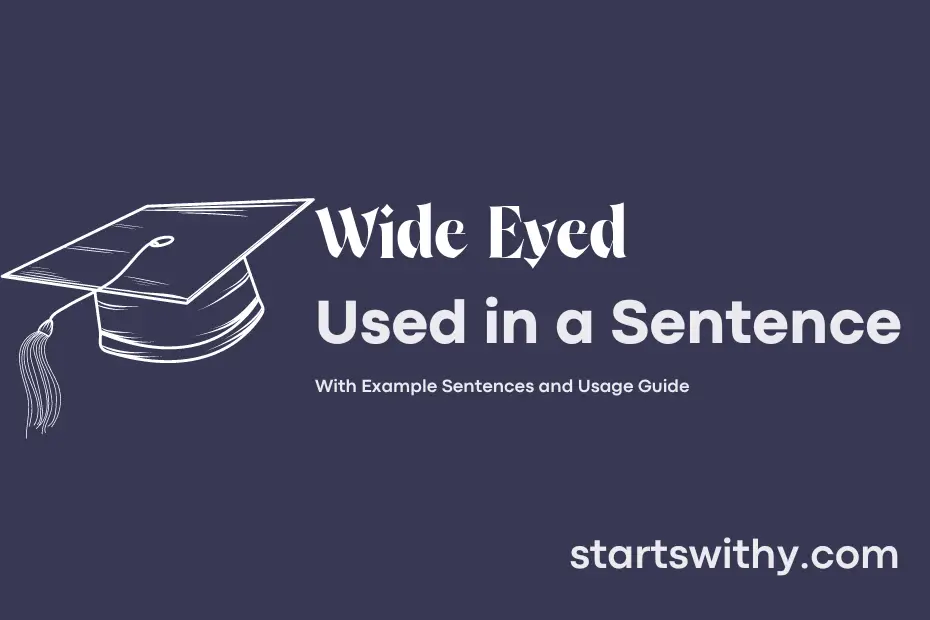Have you ever been so amazed or surprised that your eyes widened in astonishment? This expression, often referred to as being “wide-eyed,” embodies the sense of wonder or shock that we experience in certain situations.
When someone is wide-eyed, their eyes open wide to take in all that is happening around them, signaling a moment of disbelief, excitement, or awe. This figurative language captures the intense emotions felt when encountering something unexpected or extraordinary, allowing us to convey a sense of wide-eyed wonder through a simple gesture.
7 Examples Of Wide Eyed Used In a Sentence For Kids
- Wide eyed, the children watched as the magician pulled a rabbit out of his hat.
- The little boy looked wide eyed at the colorful butterflies fluttering in the garden.
- Wide eyed, she saw a rainbow after the rain stopped.
- The puppy wagged its tail, looking at the world around it with wide eyed wonder.
- Wide eyed, the students listened as the teacher read a magical story.
- The baby stared wide eyed at the twinkling stars in the night sky.
- The astronaut gazed out at the planets, his helmet reflecting his wide eyed expression.
14 Sentences with Wide Eyed Examples
- Wide eyed, the college students listened attentively to the guest speaker.
- The group of friends stared wide eyed at the exam results posted on the notice board.
- Wide eyed with excitement, the students eagerly signed up for the college festival activities.
- As the professor explained the new research findings, the students looked on wide eyed.
- Wide eyed, the students entered the library for the first time, amazed by its vast collection of books.
- The students watched wide eyed as the chemistry experiment produced colorful reactions.
- Wide eyed with curiosity, the students explored the campus after dark.
- The college athletes were left wide eyed after seeing the brand new sports facilities.
- Wide eyed and eager to learn, the students participated in the coding workshop.
- The students were wide eyed when they heard about the opportunity to study abroad.
- Wide eyed with disbelief, the students listened to the professor announce the cancellation of classes due to a sudden snowstorm.
- The students were wide eyed when the famous alumni walked into the lecture hall.
- Wide eyed and nervous, the students waited for their turn to present their project to the panel of judges.
- The group of college friends sat wide eyed as they watched a intense movie marathon in the common room.
How To Use Wide Eyed in Sentences?
Wide Eyed is used to describe someone who is very surprised or amazed by something they see or hear. To use it in a sentence, simply place the term “Wide Eyed” before the action or reaction of the person you are describing.
For example, you could say, “She stared at the fireworks display with her eyes Wide Eyed in amazement.” In this sentence, the term “Wide Eyed” is used to emphasize the level of surprise and wonder the woman felt while watching the fireworks.
Another example could be, “The children listened to the magician’s tricks with their eyes Wide Eyed in disbelief.” Here, the term “Wide Eyed” is used to convey how shocked and astonished the children were while watching the magician perform.
Overall, using “Wide Eyed” in a sentence is a simple way to describe someone who is deeply impressed, astonished, or shocked by something they are experiencing. Remember to place the term before the action or reaction you are emphasizing to effectively convey the level of surprise or amazement being demonstrated.
Conclusion
In conclusion, sentences with “wide-eyed” typically describe someone who is surprised, amazed, or in awe of something. These sentences convey a sense of wonder and astonishment, often emphasizing the intensity of the person’s emotions. When someone is wide-eyed, their eyes are fully open and their expression reflects a state of disbelief or admiration. This phrase is frequently used in storytelling to vividly portray a character’s reaction to an unexpected or impressive sight.
By incorporating sentences with “wide-eyed” into writing, speakers and writers can effectively convey the powerful emotions and reactions of characters or individuals in a descriptive manner. This phrase adds depth and nuance to storytelling, helping to create a more engaging and immersive experience for the audience.



